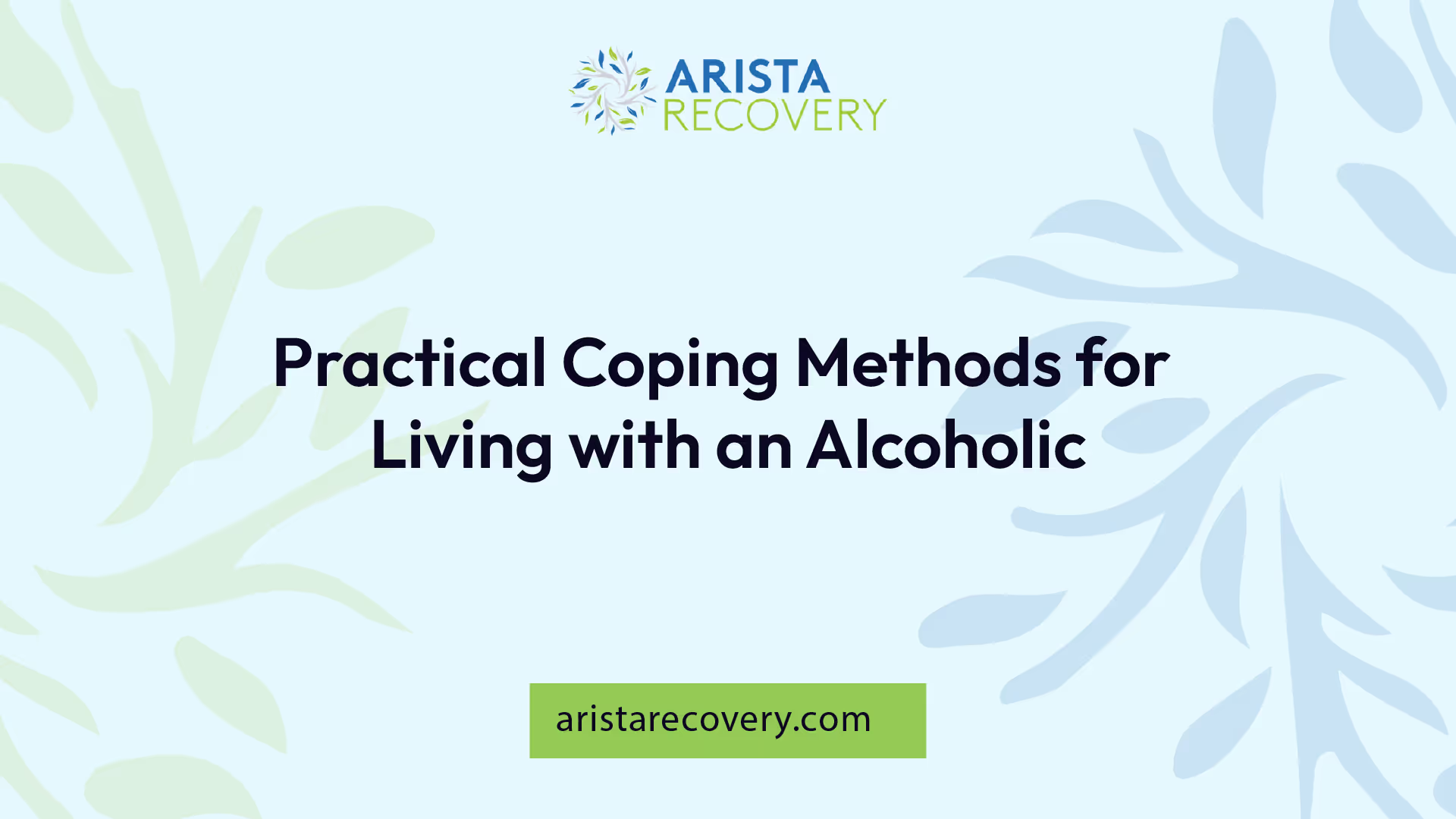Practical Coping Methods for Living with an Alcoholic

Coping with Alcohol Addiction
Coping with someone struggling with alcohol addiction can be challenging. Understanding the importance of seeking professional help and participating in self-help or mutual aid groups is essential for both the individual affected and their loved ones.

Seeking Professional Help
Consulting with a professional drug and alcohol interventionist is a recommended first step in creating a recovery plan for families and partners affected by alcohol addiction [1]. Professional assistance helps in navigating the complexities of addiction, including treatment options and coping strategies.
For individuals requiring intensive rehabilitation after ceasing alcohol consumption, options such as attending community support programs or undergoing residential rehabilitation are available. These intensive treatments are typically recommended for those with medium to high levels of alcohol dependence [2].
In Florida, families can utilize the Marchman Act, allowing a judge to order involuntary rehab for their loved one [3]. This legal option can facilitate entry into treatment when voluntary options are not feasible.
The availability of local treatment services varies. Local authorities oversee these programs, determining eligibility and funding through specific assessments. Private residential rehabilitation services may also be funded by medical insurance for a set duration. It is important to note that most individuals with Alcohol Use Disorder (AUD) can benefit from some form of treatment, leading many to significantly reduce their drinking and related problems.
Self-Help and Mutual Aid Groups
Self-help or mutual aid groups, such as Alcoholics Anonymous (AA) and SMART Recovery, are widely accessible options for those living with alcohol addiction. These groups provide essential support outside traditional healthcare services [2].
Various treatment options exist within these support systems, including behavioral treatments, medications, and mutual-support initiatives like AA. Joining these groups offers numerous benefits:
Benefits of Self-Help GroupsDescriptionShared ExperienceMeeting peers who have faced similar challenges.ResourcesAccess to advice and support from group members and sponsors.Strengthened BondsForming new friendships that foster sobriety.Social ActivitiesParticipating in outings that help maintain social connections.
Support groups not only provide emotional support but also assist individuals in maintaining their sobriety. Engaging with others in recovery can enhance their commitment to long-term sobriety and help manage the psychological aspects of living with or supporting someone with alcohol addiction [5].
Treatment Options for Alcohol Addiction
Exploring treatment options for alcohol addiction is essential for those seeking to cope with the impacts of living with an alcoholic. Here, two primary approaches will be discussed: intensive rehabilitation programs and medication-assisted treatment.
Intensive Rehabilitation Programs
Individuals requiring intensive rehabilitation after ceasing alcohol consumption have several options available. These include attending a community program or undergoing a residential rehabilitation service. Intensive treatments are typically recommended for individuals with medium to high levels of alcohol dependence.
Type of TreatmentDescriptionCommunity ProgramsLocal support and counseling programs that provide group therapy.Residential RehabilitationInpatient facilities that offer comprehensive care and support.
These programs often include a combination of medical support, counseling, and individual therapy. They aim to address both the psychological and physical aspects of addiction, equipping individuals with strategies to maintain sobriety.
Medication-Assisted Treatment
Medication-assisted treatment (MAT) utilizes specifically approved medications to assist individuals in stopping or reducing their alcohol consumption, and preventing relapse. FDA-approved medications for alcohol use disorder include:
These medications can be used in conjunction with other therapeutic interventions, such as inpatient treatment, outpatient care, and individual therapy to provide comprehensive support [6].
MedicationPurposeAdministeredNaltrexoneReduces cravingsOral tabletAcamprosateRestores brain chemistryOral tabletDisulfiramDeterrent from drinkingOral tablet
Both intensive rehabilitation programs and medication-assisted treatment offer effective paths for individuals looking to manage their alcohol addiction. These methods serve as coping strategies for living with an alcoholic, providing essential support for recovery.
Dealing with an Alcoholic Spouse
Coping with an alcoholic spouse is a challenging journey that often requires strategic approaches to maintain personal well-being while supporting their partner. Two fundamental strategies in this process are setting boundaries and consequences, and seeking support from others.
Setting Boundaries and Consequences
Establishing clear boundaries is critical for individuals living with an alcoholic spouse. Boundaries help to protect personal mental and emotional health. They serve as a way to outline acceptable behaviors and actions, ensuring that the alcoholic partner understands the consequences of their actions.
Boundary TypePurposeConsequencesEmotional BoundariesProtect mental well-beingEmotional withdrawal during alcoholism episodesFinancial BoundariesPrevent misuse of fundsLimitation on shared finances when drinking occursBehavioral BoundariesDefine acceptable behaviorsSetting conditions for continued cohabitation, such as seeking help
Without these boundaries, the alcohol user may not see the need for change, feeling comfortable with their habits. It is essential that boundaries are enforced consistently to foster accountability, helping both partners understand the impact of alcohol use on their relationship.
Seeking Support from Others
Seeking support is crucial for individuals dealing with an alcoholic spouse. Connecting with others who understand the situation can provide relief, resources, and potential solutions for coping with the challenges faced. Various online resources and support groups can assist both the individual struggling with alcohol misuse and their family members.
Support can be found through:
Engaging in these support systems can alleviate feelings of isolation and empower individuals with coping methods for living with an alcoholic. Confronting an alcoholic spouse about their alcohol use often requires multiple conversations. Highlighting the impact of their drinking and providing options for seeking help are essential steps in this ongoing dialogue [6].
Building a strong support network along with clear boundary-setting can significantly improve the quality of life for individuals living with an alcoholic partner.
Preventing Relapse in Recovery
Preventing relapse is a fundamental aspect of maintaining long-term sobriety for individuals recovering from alcohol use disorder (AUD). Understanding effective strategies can empower those in recovery and their loved ones to sustain positive changes.
Strategies for Long-Term Sobriety
Implementing effective strategies is crucial for those in recovery. Approximately 66% of individuals who enter treatment for an alcohol use disorder experience a relapse at some point, but at least 33% do not American Addiction Centers. Here are some key strategies to help prevent relapse:
StrategyDescriptionAvoid TriggersIdentify and steer clear of situations, people, or places that encourage drinking.Practice Self-CareEngage in healthy activities such as exercise, good nutrition, and sufficient sleep to enhance overall well-being.Build a Support NetworkLeverage family, friends, support groups, and recovery communities for encouragement and accountability.Participate in Aftercare ProgramsEnroll in ongoing counseling or support groups to maintain motivation and share experiences.
These strategies provide a foundation for individuals to safeguard their sobriety and enhance their chances of a successful recovery.
Involuntary Rehab under the Marchman Act
In cases where an individual is resistant to seeking treatment, families can leverage legal frameworks like the Marchman Act. In Florida, this act allows families to petition a judge to order a loved one into involuntary treatment for substance misuse American Addiction Centers.
The process typically involves:
Understanding the Marchman Act provides families with an option to intervene when an alcoholic refuses help, ensuring that support is available even in challenging situations.
Post-Rehab Support and Aftercare
After completing a rehabilitation program for alcohol addiction, it is essential to focus on ongoing treatment and building a robust support system. These aspects play a critical role in an individual's recovery journey and can significantly impact long-term sobriety.
Importance of Ongoing Treatment
Ongoing treatment, often referred to as aftercare, provides essential support to individuals post-rehab. Many people benefit from continuing counseling, mutual-help groups, and safe, substance-free sober living environments. Programs may also include alumni events that foster connections with others who share similar experiences [3].
Type of Aftercare SupportDescriptionContinuing CounselingOngoing therapy sessions to address underlying issues and maintain emotional health.Mutual-Help GroupsSupport networks such as Alcoholics Anonymous that offer shared experiences and encouragement.Sober Living EnvironmentsStructured settings that promote abstinence and provide peer support during recovery.Alumni ProgramsMeetings and events aimed at reconnecting with others who have completed similar programs.
Continued participation in support services is crucial during the initial months following rehab. Research indicates that remaining connected to a support network decreases the likelihood of relapse. Gradually reducing participation is generally recommended based on an individual's progress in recovery, but completely cutting ties with support resources can be counterproductive.
Building a Strong Support System
Establishing and maintaining a solid support system is a key factor for those recovering from alcohol addiction. Friends, family, and mental health professionals are vital in providing encouragement and assistance throughout the recovery process. Engaging with support groups like Alcoholics Anonymous and Al-Anon also proved beneficial for many individuals.
Support System ComponentsBenefitsFamily and FriendsEmotional support, understanding, and motivation during challenging times.Mental Health ProfessionalsProfessional guidance to address underlying issues and prevent relapse.Support GroupsShared experiences that foster a sense of community and accountability.Alumni NetworksConnections with peers who understand the recovery journey.
Having a strong support network can significantly bolster an individual's mental health and self-esteem. This, in turn, aids in maintaining sobriety and managing the complexities of living with alcohol addiction [5]. By prioritizing ongoing treatment and cultivating a robust support system, individuals can navigate the challenges in their recovery journey more effectively.
Practicing Self-Care in Recovery
Prioritizing self-care is essential in the recovery journey from alcohol addiction. This involves focusing on both physical health maintenance and mental and spiritual wellness.
Physical Health Maintenance
Maintaining physical health is vital during recovery. Individuals should focus on several key practices to support their bodies and overall well-being:
Health PracticeBenefitsExerciseImproves mood, reduces stressHydrationAids in detoxificationBalanced DietSupports healing, boosts energyQuality SleepEssential for recovery, enhances clarityRegular Check-upsMonitors health, addresses medical issues
For more information on maintaining physical health in recovery, visit Ashley Addiction Treatment.
Mental and Spiritual Wellness
Fostering mental and spiritual wellness is a critical aspect of addiction recovery. It involves several practices and considerations:
Wellness AspectPracticesSpiritual HealthYoga, meditation, acupunctureMental HealthPsychological care, stress minimization
Encouraging mental and spiritual wellness during recovery supports individuals in achieving a more holistic approach to their healing journey. For further details, see Ashley Addiction Treatment.
References
[2]:
[3]:
[4]:
[5]:
[6]:
[7]:
[8]:
You’re not alone in this.
When mental health challenges and addiction intersect, it can feel isolating. At Arista, we offer compassionate, evidence-based, and trauma-informed care to help you heal, grow, and move forward.
You’re not alone in this.
When mental health challenges and addiction intersect, it can feel isolating. At Arista, we offer compassionate, evidence-based, and trauma-informed care to help you heal, grow, and move forward.
Support that moves with you.
You’ve taken a brave first step. At Arista Recovery, we’re here to help you continue with best-in-class care designed for long-term healing and support.
.webp)






